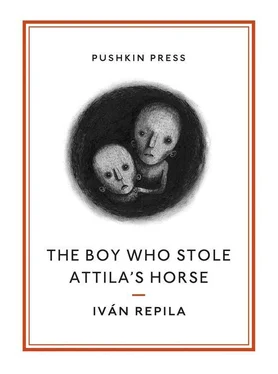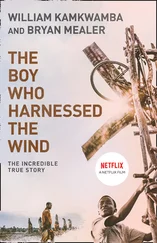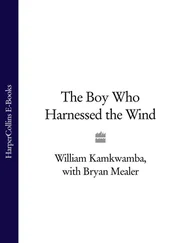It stopped raining two days after the storm reached them. By then, the well had turned into a bog and its walls had warped. Their legs sunk into the wet, fudgy ground, their clothes began to rot after the prolonged exposure to the damp, and the mud seeped into their testicles and limbs. Big had not been able to do his exercises, and Small, who imagined the well like a limp, sagging coffin, stopped collecting food. They didn’t celebrate the clear sky or the heat of the sun because their numb muscles were still trembling, and because the rain shower had demanded a gruelling feat of resistance: no sinking, no drowning, no sleeping. The lack of food had begun to take its toll on their shrunken stomachs, in particular that of Small, who slipped into a feverish stupor.
As the sun starts to dry the earth and evaporate the water from the saturated soil, and the well floor firms up again, Big notices that his brother is suffering from some form of pulmonary condition. He coughs up green mucus, thick like jam, and his forehead is on fire. Big dedicates himself to the task of feeding him regularly, giving him cool water every hour, keeping his clothes dry and moving him away from the last puddles. Totally devoted to the care of his brother, he neglects both to feed himself and do his exercises. Small’s fever, however, does not abate.
To see him like this, emaciated and ashen, with the ribs of a starved greyhound, his fingers blue and forehead blazing, sick from the cold and from the phlegm, fills Big with an aching sadness. Small is a cut of barely breathing meat, settled in fitful sleep from which, every now and again, he wakes up in paroxysms of rage or of weeping and shouts garbled phrases. Big feeds him with perseverance and revulsion, but he feels a new affection when he lays him out in the sun and watches him stretch his limbs.
‘You can’t leave. You made a promise.’
At night, Big covers him with two layers of clothes to protect him from the frost. He curls up naked beside his small body and tries to warm it a little. He rubs him, kisses him, and holds him until he falls asleep.
‘Maybe I do love you,’ he says.
SMALL GOES ON DYING for days, and his brother goes on keeping him alive. As if they were playing.
Big feeds him the plumpest insects, the spongiest worms and the sweetest roots. He filters water through his shirt so that whatever he drinks is pure, crystal clear. He uses the coolest water from the morning to mop his brow, and the lukewarm water from the afternoon to wash his feet and hands and hair. When Small’s breathing returns to normal and his fever abates, Big goes back to his physical exercises. Push-ups, sit-ups, squats. His head becomes drenched with sweat, and during these hours he stops thinking about his brother’s illness; he escapes the well, charges across fields and dells and goes back. He ensures that justice is done. More than the hunger and the sun, it is the loneliness that ages him. It transforms his adolescent face into one belonging to a deeply wounded man — a man just back from a civil war or prison, his figure bent by the burden of so much toil and privation, and his big hands marked with new lines, calluses that he couldn’t erase even if he wanted to. He talks to his brother like never before:
‘When we go home we’ll eat meat.’
He cooks him some dishes that they’ve tried once or twice, and others that he doesn’t know, but can imagine. Cream of sun-blushed poppies with a few wild nuts and diced banana. Rice pudding with pink cinnamon, the rind of a lemon, a dusting of cacao and the syrup of a custard apple. Roast sea lion with strawberries and cassava in the juice of a ripe orange and coconut milk. He explains in detail how to peel potatoes, the best way to cut onions so that they soften in oil without burning, how long it takes to brown the best cut of chicken or beef. Once or twice, Small wakes up and says something in an apparent flash of lucidity. The odd word, stray sentences.
‘Laurel…’
And so Big devises lessons in botany and agriculture, comparing methods, recalling smells and shapes and tastes. When he doesn’t know them, he invents the secret reasons behind the order of things: he improvises entire cities where the natives speak other tongues; he travels beyond the cliff’s edge and encounters indescribable wonders. He talks to him about the twin moons of the North and the wandering trees of the South. He tells him about the starry doves that live in the deep lakes, of houses with eyes where windows should be, and which weep tears of wine when their owners leave. He tells him about how when his grandparents were children they endured great floods which forced them to move the entire town a few kilometres down the road; about the cemetery of giants that covers an entire continent; and about the part of the sky that you can touch because it buckled under its own weight at the other end of the earth. He constructs geographies, ways of life, and labyrinthine, fanciful maths. He invents multicoloured cereal, women with crystals for nails, and fabled miracles: clay that protects you from bad fortune; magical creatures that live in the walls and grant a thousand wishes to whoever finds them; rivers that part if you ask permission. When he senses that he’s become a bore and has exhausted his imagination, he tells him true stories.
‘Sometimes I think we aren’t really brothers.’
‘It was me who killed our dog. With a stone.’
‘I’ll die in here.’
At night they sleep very close to one another. The moon is nearly full and its white light forms a gaseous orb over the edges of the wood, the tree canopies and the paths. The fever starts to leave Small’s body, and with it his cough and the shivers and phlegm. For the first time since the storm passed they surrender to exhaustion and rest, truly rest, without interruption. They sleep so deeply that they don’t hear the footsteps moving towards the mouth of the well, or notice the figure that appears and watches them, or see it disappear to return to where it came from in total silence.
THE TWINKLE has returned to Small’s eyes, and with it the strength to collect food, but he has been left with the wastes of the fever still inside him. He does everything indifferently, as if he no longer cared to eat, or speak or breathe. His voice has changed, too: it has become darker and deeper.
‘Where are we?’
He looks with the eyes of an adult who has eaten a child and infected him with a hundred centuries of madness. From closer up you can see that his shining eyes bear the weight of a wall, a wall containing a spiral of berserk ideas that have ladder hands and a forest head. With those eyes he scans the enormous body of his brother, sensitive to small changes.
‘Drink more water. You must be dehydrated,’ says Big.
‘The real water is outside. This water is a lie.’
Big has resumed his full regime of exercises. He has spent over two weeks repeating them and this, along with his limited diet, has caused his muscles to develop strangely; they are misshapen, somewhere between those of a half-starved man and a mastiff. He is aware of the strain he is putting his body under, and that if he had to run, his heart would barely hold out for two kilometres before collapsing. His training is reproducing an incredibly short muscular memory, a kind of corporal amnesia that stretches the limits between survival and progress.
‘I’m tired of the well. I’m leaving,’ says Small.
‘OK.’
‘You don’t think I can?’
‘No. I don’t think you can.’
‘In that case, I’ll leave you here to rot,’ says Small, and his brother looks at him and doesn’t recognize him.
Hours go by and neither says a word: Big, dumbfounded by the newfound independence of his brother’s tongue; Small, consumed by his own musings and becoming ever more miserable.
Читать дальше












